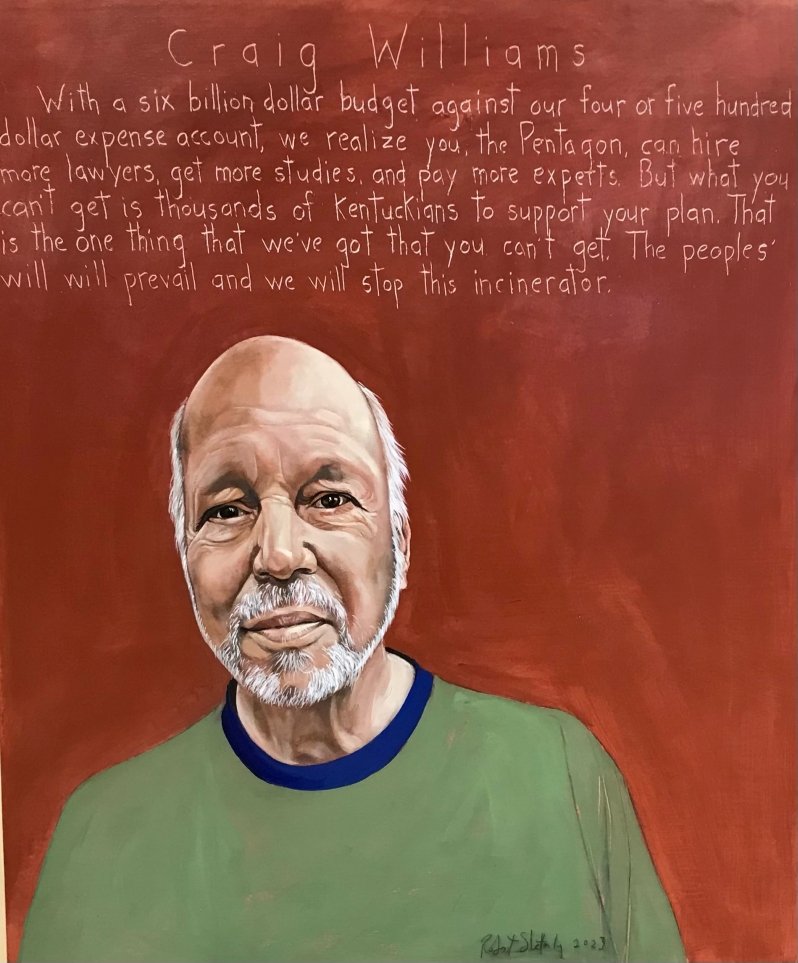
Craig Williams
Environmentalist, advocate for safe destruction of chemical weapons; b. 1948
“With a six billion dollar budget against our four or five hundred dollar expense account, we realize you, the Pentagon, can hire more lawyers, get more studies, and pay more experts. But what you can’t get is thousands of Kentuckians to support your plan. That is the one thing we’ve got that you can’t get. The peoples’ will will prevail and we will stop this incinerator.”
Biography
- First National Citizens Conference on Chemical Weapons, hosted in Richmond, Kentucky (1990)
- North American recipient of the Goldman Environmental Prize (2006)
- Founder and executive director of the Kentucky Environmental Foundation
- Chair of the Kentucky Governor’s Chemical Material Demilitarization Citizens Advisory Commission
- Co-chair of the Kentucky Chemical Destruction Citizens Advisory Board
- Last chemical weapons at the Bluegrass Army Depot were safely destroyed (July 7, 2023)
Craig Williams and his wife Teri went to a community information meeting at the Bluegrass Army Depot nearly forty years ago, and were appalled to hear the Army’s plans to incinerate a huge arsenal of toxic chemical weapons dating back to World War One in several sites, including one just a few miles from their home in Madison County, Kentucky.
Craig tells the story: Teri looked at me and said, “Somebody’s got to do something about this.” And so, since I always do what my wife tells me, forty years later, here I am.”
Concerned about the dangerous technology being used by the Army, Craig began working with other citizen groups living near incinerator sites in the U.S., as well as sites in the Pacific and in Russia. They secured funding to hire experts to testify about the dangers of incineration and procured “documents that showed 14 live agent releases from the stacks of their incinerators in the Pacific and in the Utah desert.”
In response to citizen concerns, Congress directed the Army to develop a program to study alternative technologies and developed the “Assembled Chemical Weapons Assessment” program that identified six technologies capable of “closed-loop chemical destruction” (where chemical weapons are neutralized without being released into the environment) – two of which were ultimately used to safely destroy the weapons.
Asked about his leadership in advocating for these changes, Craig said, “The biggest rule of thumb that I espouse is the importance of credibility.” He noted that the activist community must present accurate information. “Military and politicians can be caught lying on a Tuesday, be discovered misrepresenting the truth on Wednesday then say something on that topic on Thursday and be believed”, adding that the activist community does not have this luxury.
Work to bring about an “environmentally secure conclusion to the chemical weapons issue” took almost four decades of collaborative work by grassroots organizations and individuals. These grassroots organizations worked together to establish the inaugural National Citizens Conference on Chemical Weapons in 1990. Hosted in Richmond, KY, the landmark event welcomed representatives from other U.S. sites where chemical weapons were stored, the Pacific islands, and the Russian Federation. The conference culminated in the creation of the “Citizens’ Accords on Chemical Weapons Disposal,” which emphasized prioritizing environmental and public health protections and community involvement in decisions related to disposal methods. This conference resulted in the formation of The Chemical Weapons Working Group, an international coalition focused on safe disposal.
Craig also founded the Kentucky Environmental Foundation (KEF) and serves as its Executive Director. He is also charter member and Chair of the Kentucky Governor’s Chemical Material Demilitarization Citizens Advisory Commission and currently serves as co-chair of the Kentucky Chemical Destruction Citizens Advisory Board.
NERVE, an hour long film about “the remarkable story of how Vietnam vet and Goldman Prize-winner Craig Williams and the KEF led the nearly four-decade global fight to safely rid the world of chemical weapons,” won the Grand Jury Prize at the Environmental Festival at Yale in 2016, and the 2018 Whistleblower Award at Cinema Verde Film Festival.
In April 2006 Craig was the North American recipient of the prestigious Goldman Environmental Prize, which is given annually to just one activist per continent. In 2008 he was awarded an honorary doctorate degree in Humanities from Eastern Kentucky University. Craig is a co-founder and secretary of the Vietnam Veterans of America Foundation which shared the 1997 Nobel Peace Prize for their international campaign to ban landmines. He has received several accolades from the U.S. Congress, as well as the John Connor Citizens Achievement Award.
On July 7, 2023 the last remaining chemical weapons stored at the Bluegrass Army Depot in Richmond, Kentucky, were safely destroyed. Being the final storage site in the United States, this also marked America’s compliance with the international chemical weapons treaty. At a community celebration of this momentous event, Craig modestly described himself as the poster boy for this success, acknowledging and introducing the many other citizens who deserved credit. Craig, a father, grandfather, little league and soccer coach, woodworker and prodigious organic gardener, honored his wife Teri, thanking her for her care of the family which made his work possible, adding, “And, she is beautiful.”
Programs
Americans Who Tell the Truth (AWTT) offers a variety of ways to engage with its portraits and portrait subjects. Host an exhibit, use our free lesson plans and educational programs, or engage with a member of the AWTT team or portrait subjects.

Education
AWTT has educational materials and lesson plans that ask students to grapple with truth, justice, and freedom.

Exhibits & Community Engagement
AWTT encourages community engagement programs and exhibits accompanied by public events that stimulate dialogue around citizenship, education, and activism.